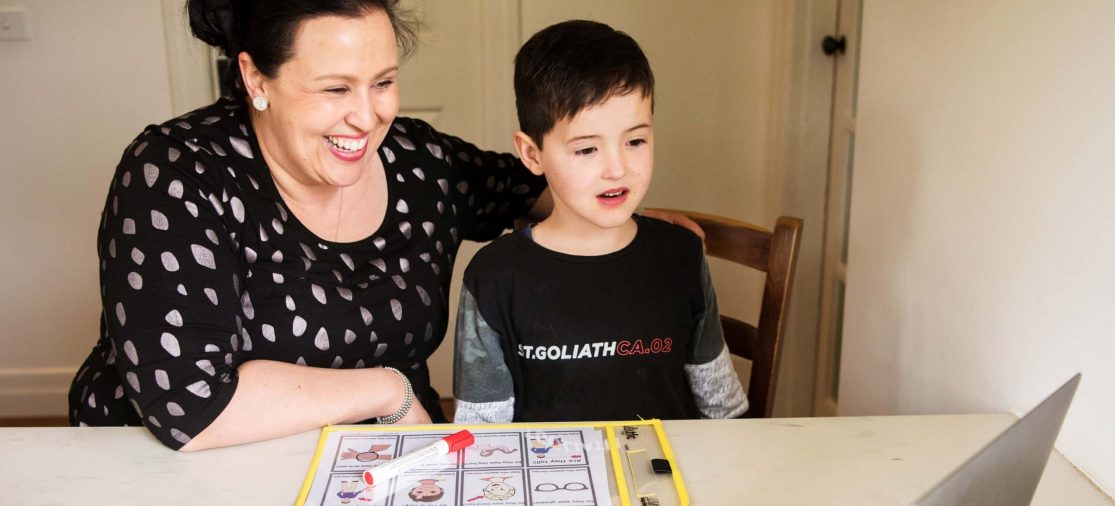Menu
Speech Therapy for Autism
Speech therapy can be an essential part of support for autistic children. Many autistic children have difficulty communicating, and speech therapy can help them develop the skills they need to communicate effectively.
A key part of speech therapy for autistic children is tailoring it to each child’s needs and abilities. Therapy Connect will work with the child and their parents to create a personalised plan that addresses their specific challenges and goals.
Speech therapy takes time and effort. It requires consistency and dedication, and it may take some time before the child starts to see significant improvements. However, with the right approach and support, speech therapy can make a real difference in the lives of autistic children.
If you have a child with autism struggling with communication and social skills, consider speaking with our team today. With the right support and guidance, your child can learn the skills they need to thrive and reach their full potential.

Do you have a child with autism?
One of the main goals of speech therapy for children with autism is to improve their language skills. This may include teaching them new words and phrases, helping them understand the meaning of words, and improving their ability to express their thoughts and ideas.
In addition to improving language skills, speech therapy can help autistic children develop social skills. Autistic children may find social interactions challenging, and speech therapy gives them the tools to communicate with others and form relationships. Speech therapists may use various techniques to help autistic children learn social skills, such as role-playing, social stories, and scenarios.

Therapy Connect: Speech Pathologist
A speech pathologist is a healthcare professional who specialises in treating communication and swallowing disorders. For autistic children, a speech pathologist can be an essential member of their support team.
Speech pathologists work with autistic children to improve their language and communication skills. They use various techniques, such as games and activities, to help children learn new words and phrases and improve their ability to understand and use language.
Verbal and Non-verbal Communication Skills
Verbal and nonverbal communication skills are essential for autistic children to learn and understand, as they can help improve social interactions and overall communication.
Verbal communication skills refer to the use of words and language to communicate, while non-verbal communication skills refer to the use of body language, gestures, and facial expressions to communicate. In addition to working on specific communication skills, a speech pathologist can help autistic children learn how to initiate and maintain social interactions, understand and follow social rules, and communicate their needs and wants. By teaching these skills, speech therapy can help improve the ability to understand and connect meaningfully with others.

Speech Therapy Can Enhance These Key Areas:
Pre-Linguistic Skills
This includes essentials such as social gestures, listening, shared focus, taking turns, comprehending cause-and-effect, pointing and reaching, symbolic play and pretend play.
Receptive Language
Following directions, comprehending questions, and, understanding concepts.
Expressive Language
Using vocalisations and words, grammar and sentence structures, telling stories, and using language in social contexts.
Augmentative and Alternative Communication (AAC)
This includes using high-tech and low-tech systems, aided or unaided AAC, electronic communication systems like Proloquo2GO and COMPASS PODD, and AAC devices.
Speech sound production
This involves building articulation and phonological skills to enhance the capacity to use spoken sounds correctly.
Preliteracy skills
Pre-literacy skills include rhyming, sequencing, print knowledge, listening for word sounds, combining sounds, and sounding out words for later use in reading and writing.
Feeding and swallowing skills
Skills such as oral motor development, and increasing the textures and variety of foods.
Fluency
Often known as stuttering, this includes skills to speak clearly and with ease.
Five other types of therapy that can help with autism
Every child with autism is unique, and what works for one child may not work for another. It’s important to work with a team of professionals, such as a developmental paediatrician, therapists, and teachers, to create an individualised plan that addresses the child’s specific needs and goals.
In addition to speech therapy, your child may benefit from:
1. Play Therapy
Play therapy aims to build emotional and social connections and help develop a sense of self through play.
It can be guided by a number of models including the Developmental Individual-difference Relationship-based model (DIR), also known as Floortime therapy.
A therapist or parent engages in activities that the child enjoys, such as playing with toys. They let the child take the lead and gradually build on these activities to help them develop new skills.
This type of therapy encourages inclusion, back-and-forth play, shared attention, engagement and problem-solving.
2. Occupational Therapy
Occupational therapists work with clients so they can take an active part in their everyday lives, focusing on holistic engagement (work, school, home and recreation) and functionality. Therapists work with autistic children to help them improve skills such as playing with toys, drawing, using tools and essential self-care such as dressing, brushing their teeth and eating.
3. Dietitian
Autistic children may have difficulty with feeding and eating. They may have a limited range of foods they will eat, or have an aversion to certain textures or temperatures of food.
A dietitian can work with the child and family to address these issues and create a plan that includes a variety of healthy foods that the child will eat.
4. Physiotherapy
Physiotherapists work with clients to assist them in reducing pain and increasing mobility to build fine and gross motor skills. Physiotherapists can assist children with autism in developing muscle strength, coordinated movement, and motor planning skills to increase their independence in daily routines and participation in education and play.
5. Psychology
Psychologists work with clients to assist them in developing coping and prevention skills for anxiety, anger, stress and other challenges. Psychologists can assist autistic children to improve friendships and social interactions, developmental and behavioural challenges and improve their mental health and wellbeing.
Benefits of Speech Therapy
Here are some of the benefits to gain through speech therapy:
- Enhanced communication skills
- A better understanding of both written and spoken words
- Improved clarity of speech and articulation
- If there is stuttering, it will be reduced to promote fluency
- Improved social interactions
- Reading, writing, and preliteracy skills
Our speech therapist can assist with the following:
- Encourage the creation of networks and connections with friends and neighbours.
- Develop your communication abilities and your sense of independence.
- Boost community and domestic participation.
Ideas to Help Yourself and Your Child
Use Visual Schedules
Visuals can make it easier to stay organised and understand what will occur throughout the day.
Create Social Stories
These stories can help autistic children in new situations.
Break Tasks into Smaller Pieces
Breaking complex tasks into smaller, more manageable steps may benefit.
Promote Self-Determination
Learning strategies like self-advocacy and problem-solving help encourage independence.
Provide Choice-Making Opportunities
Offering choices or control over certain activities helps promote autonomy.
Frequently Asked Questions
about Speech Therapy for Autism
What is Autism Spectrum Disorder?
Autism Spectrum Disorder (ASD) is a lifelong neurodevelopmental condition that impacts a person’s communication, learning, interactions and how they experience the world around them.
There is no one-size-fits-all approach for autism. Access to the right support can help people with ASD function their best in their daily lives.
Why do people choose Therapy Connect?
Therapy Connect is a leading provider of speech therapy services for autistic children. We have a team of experienced and qualified speech therapists who are dedicated to helping autistic children improve their communication and social skills.
One of the reasons why parents choose Therapy Connect for their child is our individualised approach. We understand that every child is unique, and we tailor our therapy sessions to meet each child’s specific needs. Our speech pathologists work closely with parents and other members of the child’s team to develop a customised plan to help the child progress towards their goals.
Another reason why parents choose Therapy Connect is our use of evidence-based treatments. We use therapy techniques and approaches that have been proven effective in helping autistic children improve their communication skills. Our team is trained in a wide range of therapy methods and uses the most appropriate approach for each child.
Is speech therapy effective?
While the effectiveness of speech therapy can vary depending on the individual and their specific needs, many autistic people and their families have reported positive experiences.
Speech pathologists at Therapy Connect use therapy techniques and approaches that have been proven effective in helping autistic children improve their communication skills. Our team is trained in a wide range of therapy methods and uses the most appropriate approach for each child.
How much does a speech therapy session cost?
The cost of speech therapy sessions varies. However, at Therapy Connect, our online speech therapy is covered by NDIS.
What if my child needs more than one approach?
Therapy Connect has a team of 70+ Speech Pathologists, Occupational Therapists, Dieticians, Physiotherapists and Psychologists, and we can facilitate a multi-disciplinary approach to therapy.
Final Thoughts
Speech therapy can be a valuable tool for autistic children to improve their communication and social skills. By working with one of Therapy Connects qualified speech therapists, autistic children can learn how to communicate their best with others and participate in their daily activities.
At Therapy Connect, we are committed to providing the highest quality of care to children with autism. We offer a supportive and inclusive environment where children feel comfortable and engaged in their therapy sessions. We also provide support and resources for parents to help them understand and support their child’s therapy goals.
If you are looking for a speech therapy provider for your child with autism, consider Therapy Connect. Our experienced and compassionate team is ready to help your child develop the skills to communicate effectively and participate in their daily activities.
